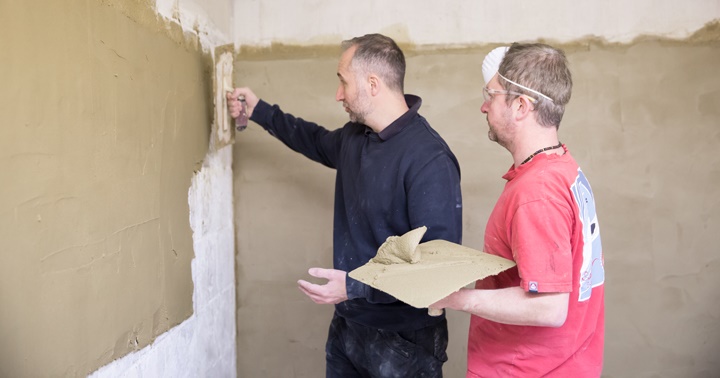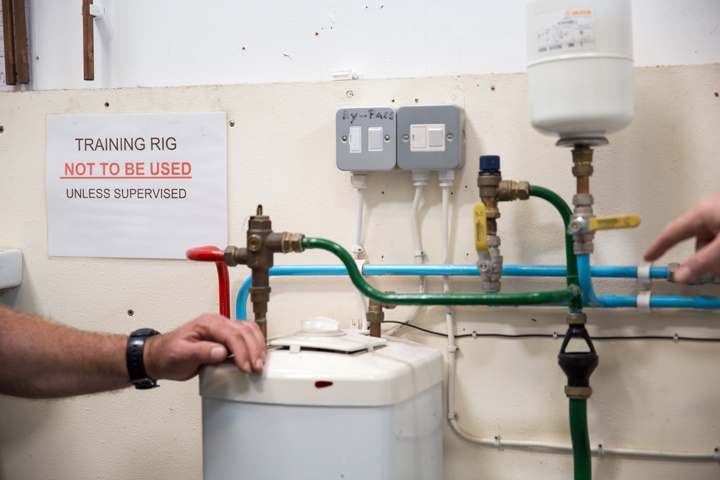
Leaving your comfort zone behind and training for a new career can a very intimidating prospect, but if you've grown weary of your current role, it may be the best decision you ever make.
Here at Access Training, we specialise in career change courses for people who wish to learn a trade (such as plumbing or plastering) and make a living out of it. Our courses are designed for individuals with absolutely no experience or knowledge of their chosen trade, so even if you've never so much as changed a fuse or unblocked a sink, you can become a fully-qualified electrician or plumber within a surprisingly short period of time.
Here's a quick overview of what to expect when you train for a new career with Access Training Academies:
Industry-recognised qualifications
The key to starting a successful new career in any trade is gaining the qualifications that will mark you out as a qualified member of that particular field. Gas engineers, for instance, must undergo an ACS assessment and join the Gas Safe Register before they can start earning money.
The new career courses we deliver here at Access Training are specifically structured to get you the qualifications you'll need to succeed in your new role. Instead of researching which certificates and accreditations you need to seek out, you can simply pick a course package - like, for instance, our Professional Gas Engineer Course - and begin your training, secure in the knowledge that we've covered all the essentials.
Help from experienced tutors
All of our course leaders are qualified tradespeople with years of commercial experience in their respective fields. This means that they are perfectly placed to provide all the assistance and instruction you could possibly require.
Furthermore, we aim to keep our class sizes as small as possible, so you can rest assured that you'll have plenty of opportunities to talk things out with your tutor as you progress through your chosen training course.
Intensive training programmes
Our career change courses are designed to get you qualified as quickly as possible. Instead of signing up for an apprenticeship and waiting several years to become a fully-fledged tradesperson, you can get trained up in a matter of months and start your exciting new career right away. This is a great choice if you can't afford to take a loss of income as you transition from one career path to another.
Learn from the ground up
As mentioned above, our courses cover everything a professional tradesperson needs to know. Don't worry if you don't know the first thing about electricity - we'll start from the absolute basics and work up from there, ensuring that you get plenty of support as you learn.
Our new career courses comprise a finely-tuned combination of theory and practical work. We'll make sure you know everything you need to know about your new trade, but we'll also ensure that you leave with plenty of hands-on experience so that you're completely confident when you show up for that first paid job.
Ready to train for a new career? To find out more about our career change courses, contact Access Training today or choose from the options listed below.
New Career Training Courses:

Gas engineers are among the most in-demand tradespeople of all, and if you're willing to put in the work necessary to get certified and join the Gas Safe Register, you'll be able to do all sorts of jobs that less-qualified workers are unable to tackle.
With that in mind, it's easy to see why gas courses are such a popular choice amongst people who are looking to change careers. But is a gas course the right choice for you? And are gas training programmes really worth the price tag?
Benefits of training to be a gas engineer
- Take advantage of the skills shortage. The UK is currently experiencing a shortage of skilled tradespeople, and our forthcoming departure from the European Union is expected to exacerbate the situation still further. However, this is actually very good news for you if you're considering quitting your current job and learning a trade instead - as a newly-qualified gas engineer, you should have no shortage of lucrative jobs to take on.
- Work on a wide range of appliances. Gas engineers don't just fix boilers. Once you're on the Gas Safe Register, you'll potentially be called upon to fix everything from ovens to hobs to fireplaces. If you're also qualified as a plumber (gas and plumbing qualifications often go hand-in-hand), you can also add sinks, showers, toilets and bathtubs to that list. This should mean that your days are both busy and enjoyably varied.
- Make lots of money! According to totaljobs.com, the average salary for a gas engineer in the UK is in excess of £32,000. That's a very appealing pay packet indeed, especially when the work itself is so rewarding and enjoyable.
How much does it cost to become a gas engineer?
Gas engineers can enjoy lucrative salaries, but of course, it does cost money to train as a gas engineer. However, we think you’ll agree, the pros above are well worth that initial expense!
The cost of training to become a gas engineer can vary greatly depending on a range of factors, including the course you study, the qualifications you’re hoping to achieve, and how long you study for. Here at Access Training we offer flexible training options to suit your unique requirements, including fast track, training finance plans, and ‘earn as you learn’ gas engineer training courses.
Gas courses from Access Training
If you're ready to begin your new career path, you'll be pleased to learn that we offer a comprehensive range of gas engineer training courses here at Access Training Academies. Our training packages are affordable and great value for money; furthermore, we offer flexible payment plans and finance options across all of our courses.
2020 UPDATE: We are pleased to announce that, in response to the COVID-19 pandemic, we are now offering live online training sessions. This means that you can begin your gas training at home - join our virtual classroom, put your questions to our expert tutors, and learn the key theory that all gas engineers must know. The practical component of your gas course will take place at our fully-equipped training centre, where you'll be able to put your knowledge into practice and get plenty of hands-on experience.
Click the links below to find out more about each training course:
No matter what trade you'd like to learn, please contact Access Training today to find out how we can help you to achieve your career ambitions!
If the office life isn’t for you because you prefer working with your hands and learning practical skills you should consider learning a trade skill. These skills are in high demand here in the UK due to a countywide skills shortage. Learning a trade skill can be fun and rewarding and you won’t need to spend years in University before starting your career. Here are more reasons why you should start training with Access Training Academies.

Gain these qualifications and learn the practical skills required with Access Training Academies.
Access Training intensive courses are built to suit you, whether you are a beginner wanting to learn a new skill, or a professional wanting to enhance your qualifications, there is a course to suit you.
If you'd like advice about any of the courses we offer we are more than happy to help. Feel free to contact us today.
The UK is currently suffering from a shortage of trade skills. As these trade skills are in such a high demand there has never been a better time to train. Working a manual trade is a rewarding career choice and you don’t have to spend years in University to start. Learn more about why you should qualify in a trade with Access Training from our trade infographic.

You can complete the necessary qualifications and these specialist courses with Access Training.
Choose from Essential, Professional and Premier intensive courses – something to suit everyone whether you are a beginner or just enhancing your skills!
Contact Access Training now to find out more about any of the course packages we offer.

Photo courtesy of pexels.com
So, you're sick of your current job and you want to make a change as soon as possible. You could simply apply for a role elsewhere, but what if it's not your present employer or workplace that you have a problem with? What if you're looking to switch to a different line of work entirely?
If that's the case, you'll often have to retrain and you can have the opportunity to do so by looking into our intensive trade courses. As we explained in our last blog post, What Are the Best Careers to Retrain For?, learning a new skill and becoming a professional tradesperson is a great career change option, but is it the right choice when you're specifically looking to make a QUICK career change? In other words...
Is it possible to become a qualified tradesperson in a short space of time?
The 'traditional' training route for plumbers, electricians and other tradespeople is unfortunately rather time-consuming. An apprenticeship takes several years to complete, meaning that you'll be stuck at the training stage for quite a while before starting your new career proper.
Fortunately, there are faster ways to get qualified. A good intensive / fast-track training course will cover everything you need to know (including all relevant theory knowledge as well as the practical skills you'll be using on the job) in a matter of months rather than years, making this a far better option for those looking for a fast career change.
Of course, successfully completing a fast-track trade course requires a lot of hard work, but your effort will pay off in a number of different ways:
- You'll be able to start your new career sooner
- You'll be learning your new trade instead of making tea for your boss (as can unfortunately be the case for apprentices)
- You'll have the opportunity to grow your skill set rapidly by taking on additional training courses if you wish
Intensive training courses from Access Training - starting a new career
Our intensive fast-track training courses allow to make a quick career change that doesn’t need a degree, and allows you to get working in a new high-paying career as soon as possible.
If you're looking for a fast career change and are hoping to get trained up ASAP, Access Training's fast-track courses are ideal for you. Contact us now to discuss your options, or click one of the following links to find out more:
Last updated 5th July 2022

If your current job has become frustrating, uninspiring, or just plain dull, then it may be time to consider retraining for a new career. You can retrain at 20, 30, 40 and beyond - regardless of your age, it's never too late to change your path!
While lucrative careers that require no qualifications or prior training do exist, such opportunities are relatively few and far between, so it's generally a better bet to undertake some form of retraining before embarking on a new career path. The best careers to retrain for can take many forms: some people choose to go back to university, or even to a sixth form college to retake their A-levels. Others enrol on apprenticeships or vocational courses.
Of course, the best retraining route for you depends very heavily on what kind of career you're looking to pursue. Here are some of the questions you should be asking...
What career should I retrain for?
Typing 'best careers to retrain for' into Google produces all sorts of different answers to this question. One website tells you to become a chef; another recommends logistics, firefighting and air traffic control. There doesn't seem to be any real consensus as to what the best career path is, and while that's perfectly understandable - everybody is different, and one person's dream job is another person's nightmare - we'd like to make the case today for learning a trade and retraining as a tradesperson.
There are countless opportunities for qualified tradespeople in the UK right now. The government made house building a key focus of their latest budget, and if their targets are to be met, the country will need a lot more workers who are capable of building new properties and providing them with water and electricity. And that need is set to become even greater over the coming years - according to the Telegraph, the UK's construction industry workforce will decrease by 20 to 25% in the next decade. New, skilled workers are needed to fill that gap, so if you're weighing up prospective career options, getting into the trade could well be a very good retraining choice indeed.
Retraining options for budding tradespeople
The government's stated goal is to build 300,000 homes a year. Lots of different skills are required to construct a habitable modern home; bricklayers and carpenters will be in very high demand, of course, but so will the following people:
Electricians
Homes need electricity, and only a qualified electrical engineer can legally perform electrical installations. Why not retrain as an electrician with the help of Access Training?
Electrical training courses >
Plumbers
Homes also need water, and there are many jobs for a plumber to do within a house building project. Sinks, taps, baths, toilets, showers, dishwashers...the list goes on. We offer a variety of plumbing courses if you'd like to retrain as a plumber.
Plumbing courses >
Gas Engineers
Many plumbers choose to also train as gas engineers and join the Gas Safe Register, as this enables them to carry out a wider variety of tasks (e.g. boiler installation). This is a rewarding and challenging profession for people looking to retrain.
Gas training courses >
Kitchen Fitters
Professional kitchen fitters are required to have a strong grasp of numerous specialist skills, from measuring and marking up to cutting worktops and installing cooker circuits. Retraining for a career in kitchen fitting will provide you with lots of lucrative work, and might even come in handy at home!
Kitchen fitting courses >
Want to find out more about our best retraining options? If you're ready to start retraining for your dream career, please contact Access Training Academies today.